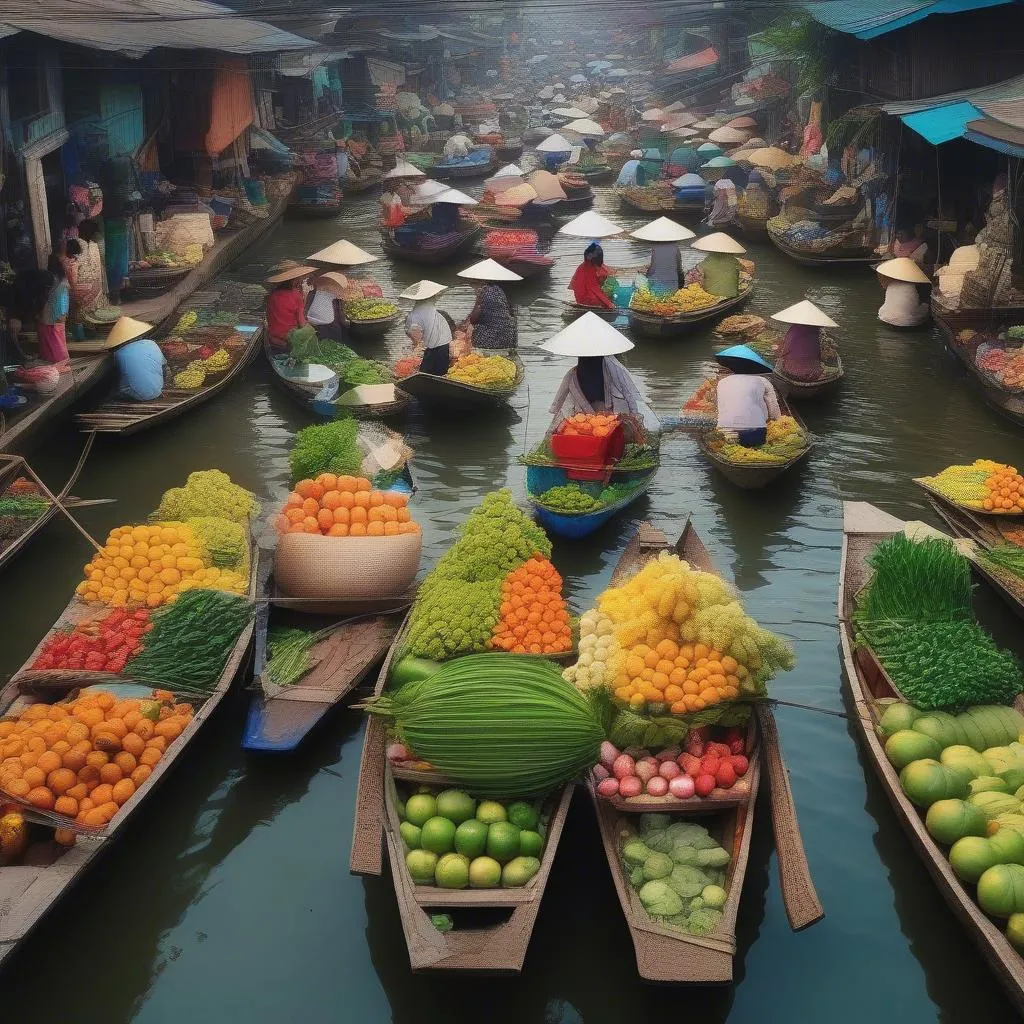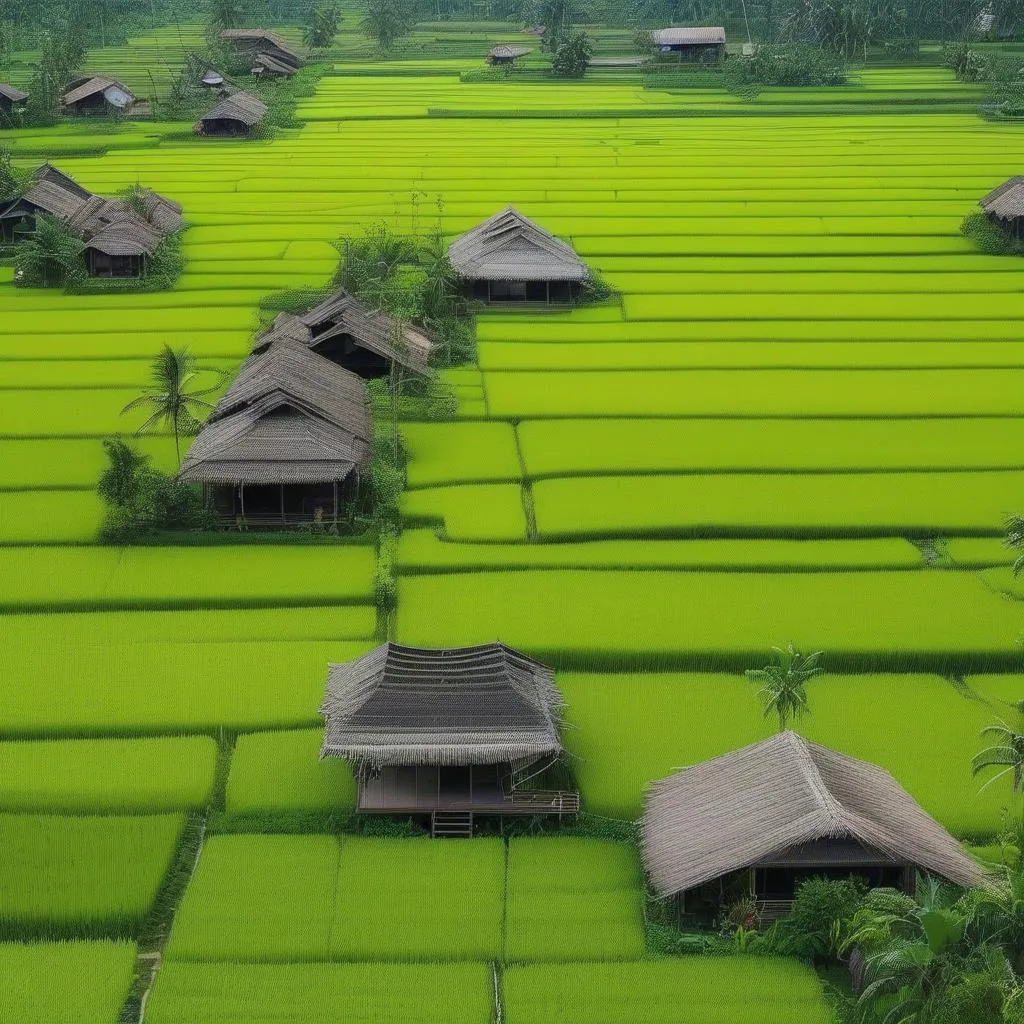Have you ever dreamt of floating markets brimming with colorful boats, their decks laden with exotic fruits and fragrant flowers? Or perhaps meandering through emerald rice paddies, the air alive with birdsong and the scent of lotus blossoms? If so, then a journey to Can Tho, the vibrant heart of the Mekong Delta in Vietnam, should be at the top of your travel list.
Unveiling the Magic of Can Tho
Can Tho, often dubbed the “Western Capital” of Vietnam, is a city where the rhythm of life sways to the gentle flow of the Mekong River. Unlike the bustling streets of Hanoi or the modern skyline of Ho Chi Minh City, Can Tho offers a glimpse into a Vietnam that feels timeless, a place where ancient traditions blend seamlessly with modern life.
A Sensory Feast Awaits
Imagine waking to the melodic calls of vendors on their boats, their voices echoing across the water as they peddle their wares at the iconic Cai Rang floating market. Witness the sunrise paint the sky in hues of pink and orange, casting a golden glow upon the bustling scene below.
Later, delve into the heart of Can Tho’s culinary scene. Savory aromas will guide you to street stalls brimming with steaming bowls of “bún riêu” (crab noodle soup) and “hủ tiếu” (pork noodle soup), each bite an explosion of flavor.
Nature’s Embrace: Embark on a Mekong Delta Adventure
Venturing beyond the city limits, a world of emerald green unfolds. Lush rice paddies stretch as far as the eye can see, interspersed with coconut groves and fruit orchards. Take a boat trip along the intricate network of canals, where you can witness the daily life of local farmers and fishermen.
Dr. Nguyen Minh Anh, a renowned anthropologist specializing in Mekong Delta culture, observes, “The Mekong Delta is a place where people live in harmony with nature. Their lives are intricately interwoven with the river’s ebb and flow.”
 floating market
floating market
Planning Your Can Tho Escapade
When to Go: Embracing the Seasons
Can Tho enjoys a tropical climate, making it a year-round destination. However, the best time to visit is during the dry season, from November to April, when the weather is sunny and dry, ideal for exploring the floating markets and surrounding countryside.
Getting There: Your Gateway to the Mekong Delta
Can Tho is well-connected by air, road, and water.
- By Air: Can Tho International Airport (VCA) receives flights from major cities in Vietnam and some international destinations.
- By Road: Comfortable buses connect Can Tho to Ho Chi Minh City (approximately 3-4 hours) and other major cities.
- By Boat: For a truly unique experience, consider taking a leisurely boat trip from Ho Chi Minh City along the Mekong River.
Getting Around: Navigating the City and Beyond
- Motorbike Taxis (Xe Om): A convenient and affordable way to zip around the city.
- Taxis: Metered taxis are readily available.
- Cyclos (Xích Lô): For a leisurely way to soak in the sights and sounds of Can Tho, opt for a cyclo ride.
- Boats: The best way to explore the floating markets and canals.
Where to Stay: From Budget-Friendly to Boutique Chic
Can Tho offers a wide range of accommodation options to suit every budget and preference. You’ll find everything from cozy guesthouses to luxurious riverside resorts.
Pro Tip: Consider staying near the Ninh Kieu Wharf area for easy access to restaurants, shops, and the riverfront.
Unforgettable Experiences: Immersing Yourself in Can Tho’s Charm
1. Witness the Magic of Cai Rang Floating Market:
A visit to Can Tho is incomplete without experiencing the bustling Cai Rang Floating Market. Wake up early to witness this vibrant spectacle at its peak.
Phong Shui Tip: The Cai Rang Floating Market is a bustling hub of energy, representing abundance and prosperity.
 rice paddies
rice paddies
2. Explore the Ancient Houses of Binh Thuy:
Step back in time as you wander through the charming village of Binh Thuy, home to beautifully preserved French colonial houses. Don’t miss the iconic Binh Thuy Ancient House, a stunning example of traditional Vietnamese architecture.
3. Cruise the Canals of My Khanh:
Embark on a boat trip through the tranquil canals of My Khanh, where you’ll glide past lush orchards, traditional houses on stilts, and local cottage industries.
4. Indulge in Southern Vietnamese Cuisine:
Can Tho is a foodie’s paradise! Be sure to sample local delicacies such as “bún mắm” (fermented fish noodle soup), “bánh xèo” (Vietnamese crepe), and fresh spring rolls.
5. Find Serenity at Bang Lang Stork Garden:
Escape the city hustle and find tranquility at the Bang Lang Stork Garden, home to thousands of storks and other bird species.
Frequently Asked Questions: Your Can Tho Queries Answered
Q: What is the currency in Can Tho?
A: The currency in Vietnam, including Can Tho, is the Vietnamese Dong (VND).
Q: Do I need a visa to visit Can Tho?
A: Visa requirements for Vietnam vary depending on your nationality. It’s recommended to check with your local Vietnamese embassy or consulate for the latest visa regulations.
Q: Is it safe to drink the water in Can Tho?
A: It’s generally advisable to drink bottled water in Can Tho.
Q: What language is spoken in Can Tho?
A: The official language is Vietnamese, but English is widely spoken in tourist areas.
Conclusion: Your Can Tho Adventure Awaits
Can Tho, with its charming blend of tradition and modernity, offers a truly unforgettable travel experience. From the bustling floating markets to the tranquil canals and the warmth of its people, Can Tho is sure to captivate your senses and leave a lasting impression.
Ready to plan your dream trip to Can Tho and the Mekong Delta? Visit travelcar.edu.vn for more travel inspiration, tips, and resources.